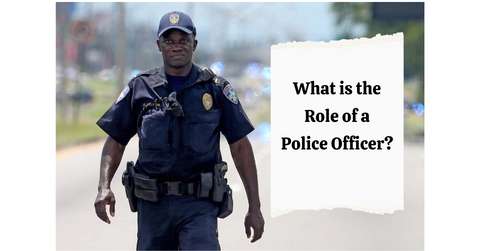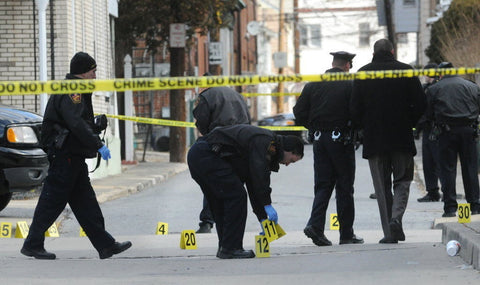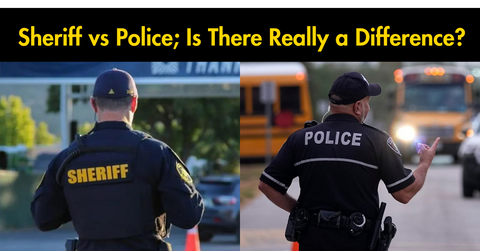
Detective vs Police Officer (The Key Differences Explained)
home >> blog articles > detective vs police officer; the key differences explained

By Brian Humenuk ✍️ COPJOT
Updated on 4/30/2024
3-minute read or less
KEY POINTS: The big picture in seconds
🔑 Different Roles, Same Mission – Police officers focus on patrol, immediate response, and maintaining order, while detectives specialize in investigating crimes after they occur.
🔑 Specialized Skills & Units – Detectives use advanced investigative techniques and often work in specialized divisions like homicide, narcotics, cybercrime, and special victims units.
🔑 Uniform vs. Plainclothes – Patrol officers wear uniforms for visibility and deterrence, while detectives often work in plainclothes to remain discreet during investigations.
🔑 Collaboration is Key – Police officers and detectives rely on each other—officers secure crime scenes, while detectives build cases to bring perpetrators to justice.
🔔 Is a Detective a COP? Or is a COP a Police Officer? Read to the end to find the answer.
Introduction
Whether you follow law enforcement fairly closely or you binge-watch crime TV, you know all too well that two distinct roles stand out: the detective and the police officer.
While both serve the fundamental purpose of maintaining law and order, their approaches, responsibilities, and the nature of their work often differ significantly.
Understanding these disparities is important in comprehending the dynamics within the realm of law enforcement.
In this article, I am going to deep dive into the roles of detectives and police officers, exploring their differences, similarities, and the collaborative efforts that contribute to the effective response to crime and the investigation for an outcome that can bring resolution to the victims and formal charges for the perpetrators.
Be sure to read my article Sheriff vs Police (Is there really a difference) next.
Let's wait no longer and dive right into Detective vs Police Officer.
What is the Role of a Police Officer?

The role of a Police Officer is patrolling assigned areas, acting as both a proactive crime fighter and a crime deterrent.
Responding to emergencies that can be anywhere from a stranded motorist or home burglar alarm to a person in cardiac arrest or an active school shooter.
Investigating crimes both in progress and in the past. This will include basic interviewing, note-taking, and evidence gathering.
Making arrests when necessary
Writing reports, submitting charges or complaints to court, and testifying on behalf of the state or commonwealth.
What is the Role of a Detective?
Unlike police officers who primarily focus on maintaining order and responding to incidents as they occur, detectives specialize in investigating crimes after they have been committed.
Detectives are tasked with gathering evidence, interviewing witnesses and suspects, and piecing together the details of a case to identify perpetrators and build a prosecutable case.
Their work requires keen analytical skills, attention to detail, and the ability to think critically to solve complex cases.
In addition to their investigative duties, detectives collaborate closely with prosecutors to prepare cases for trial, providing crucial testimony and evidence to secure convictions.
They may also liaise with other law enforcement agencies and departments to share information and coordinate efforts in multi-jurisdictional investigations.
Detectives in Small Towns vs Large Cities
The role of a detective can vary significantly depending on whether they operate in a small community or a large city.
In small communities, detectives may have a broader range of responsibilities due to limited resources and manpower.
They may be required to investigate a wide array of crimes, from petty thefts to more serious offenses, and may work closely with other agencies or departments to leverage resources.
Additionally, detectives in small communities often develop strong ties with residents, relying on community members for information and support in their investigations.
On the other hand, detectives in large cities typically specialize in specific types of crimes due to the volume and complexity of cases.
They may have access to specialized resources and technology to aid in their investigations and may collaborate with various specialized units within the police department.
The sheer size and diversity of a large city present unique challenges, such as navigating complex urban environments and managing large caseloads, requiring detectives to possess exceptional organizational and problem-solving skills.
Despite these differences, detectives in both small communities and large cities share a common goal, and that is to support the law enforcement agency in ways that can solve crime and bring forth a safer community.
Detectives in large cities often work in specialized units tailored to address specific types of crimes or law enforcement challenges. Some common units found in large city police departments include:
Homicide Unit
Detectives in the homicide unit investigate murders and suspicious deaths. They work meticulously to gather evidence, interview witnesses and suspects, and ultimately bring perpetrators to justice.

Homicide detectives often collaborate with forensic specialists and medical examiners to solve complex cases.
Narcotics Unit
Narcotics detectives focus on investigating drug-related crimes, including drug trafficking, distribution, and possession.
They conduct undercover operations, surveillance, and raids to dismantle drug networks and disrupt illegal drug activity within their jurisdiction.
Vice Unit
Vice detectives are tasked with investigating crimes related to vice activities, such as prostitution, gambling, and illegal alcohol sales.
They work to enforce laws and regulations about vice activities and may collaborate with other agencies, such as vice squads from neighboring jurisdictions.
Robbery Unit
Detectives in the robbery unit investigate armed robberies, burglaries, and other theft-related crimes.
They analyze patterns of criminal behavior, gather evidence, and work to identify and apprehend suspects involved in these offenses.
Cybercrime Unit
With the rise of technology, many large city police departments have dedicated cybercrime units tasked with investigating crimes involving computers, the internet, and digital devices.
Cybercrime detectives specialize in tracking cybercriminals, preventing cyberattacks, and protecting individuals and businesses from online threats.
Special Victims Unit (SVU)
The SVU investigates crimes involving vulnerable populations, such as children, the elderly, and victims of sexual assault or domestic violence.
Detectives in this unit receive specialized training to handle sensitive cases and provide support to victims throughout the investigative process.
Gang Unit
Gang detectives focus on investigating gang-related crimes, including violence, drug trafficking, and extortion.
They work to disrupt gang activity, gather intelligence on gang members, and prevent gang-related violence within their communities.
Auto Theft Unit
The Auto Theft Unit is another specialized division within large city police departments that focuses on investigating vehicle-related crimes.
Detectives in the Auto Theft Unit are responsible for tackling offenses such as car theft, vehicle vandalism, and illegal chop shops.
They employ various investigative techniques, including surveillance, undercover operations, and forensic analysis, to track stolen vehicles, dismantle theft rings, and recover stolen property.
Cold Case Unit
Cold case detectives specialize in re-investigating unsolved cases, often years or decades after the crime occurred.
Using advanced forensic techniques and technology, they aim to bring closure to victims' families and hold perpetrators accountable for their actions.
Are Detectives Police Officers?
Yes, detectives are considered police officers. While they may have distinct roles and responsibilities compared to uniformed patrol officers, detectives are still part of law enforcement agencies and have the authority to enforce laws, make arrests, and investigate crimes.
Key Differences Between Police Officers and Detectives
Comparing a detective to an officer reveals stark differences, despite both being police officers.
While both detectives and police officers serve vital roles in law enforcement, there are several key differences between the two positions.
Scope of Responsibilities
Police officers are responsible for maintaining public safety, enforcing laws, and responding to emergencies in real-time.
Detectives focus on investigating crimes after they have occurred, gathering evidence, and identifying suspects to bring them to justice.
Investigative Skills
Detectives require specialized investigative skills, such as crime scene analysis, evidence collection, and interrogation techniques.
Police officers are trained in basic investigative procedures but may not possess the same level of expertise as detectives.
Uniform vs. Plainclothes
Police officers typically wear uniforms while on duty, making them easily identifiable to the public.
Detectives often work in plainclothes to blend in during undercover operations and maintain anonymity during investigations.
Chain of Command
Police officers usually operate within a hierarchical structure, reporting to sergeants, lieutenants, and captains.
Detectives may have more autonomy in their investigations, but still report to higher-ranking officers within their respective units or departments.
Collaborative Efforts
Despite these differences, detectives and police officers often collaborate closely to solve crimes and ensure public safety. Their complementary skill sets and expertise make them formidable partners in the fight against crime.
For example, when a crime is reported, police officers are typically the first responders on the scene. They secure the area, gather initial evidence, and interview witnesses.
Once the scene has been stabilized, detectives take over the investigation, utilizing their specialized training to gather additional evidence, analyze forensic data, and identify potential suspects.
Likewise, police officers may seek guidance from detectives when handling complex cases that require specialized expertise or resources.
Is a Detective a Cop?
Yes, a detective is a type of law enforcement officer, commonly referred to as a cop. However, unlike uniformed police officers who typically patrol the streets and neighborhoods as well as respond to emergencies, detectives specialize in investigating crimes, gathering evidence, and solving cases.
Detectives often work in plainclothes and may belong to specialized units such as homicide, narcotics, or fraud investigation.
About the Author
Brian Humenuk isn't just an entrepreneur in eCommerce; he is also an informed leader whose experience provides followers and visitors with a look into current and past police issues making headlines in the United States.
Brian has earned three degrees in Criminal Justice, with the last, a Master of Science in Criminal Justice Administration.
Brian extends his training, education, and experience to the officers just now getting into the field so that they may become more informed police officers and stay clear of police misconduct and corruption.
You can find out more about Brian and the COPJOT story on the ABOUT US page.
Affiliate Disclosure
COPJOT is supported by its audience. If you make a purchase through links on this site, I may earn a small affiliate commission. Enough to buy myself a small coffee, and I want to thank you in advance.
More Information
Are you a Police Officer, Sheriff, or State Trooper, Law Enforcement family member or friend? Check out our Custom Police Notebooks and Metal Police Uniform Pens on our main website.
Related Articles
How to Become a Police Officer
Minimum and Maximum Ages to be a Police Officer

